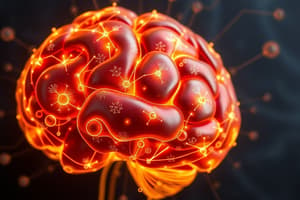Podcast
Questions and Answers
What is the term for changing your thinking to accommodate new information?
What is the term for changing your thinking to accommodate new information?
- Framing
- Accommodation (correct)
- Assimilation
- Heuristics
Which cognitive process involves using old solutions for new problems?
Which cognitive process involves using old solutions for new problems?
- Divergent Thinking
- Convergent Thinking
- Functional Fixedness
- Mental Set (correct)
What is the process of thinking of many solutions to a problem called?
What is the process of thinking of many solutions to a problem called?
- Divergent Thinking (correct)
- Priming
- Deep Encoding
- Convergent Thinking
Which fallacy involves believing that past events affect future probabilities?
Which fallacy involves believing that past events affect future probabilities?
What type of memory is associated with events in your life?
What type of memory is associated with events in your life?
Which memory type is defined as the ability to consciously recall knowledge or experiences?
Which memory type is defined as the ability to consciously recall knowledge or experiences?
What is the main function of the Central Executive in working memory?
What is the main function of the Central Executive in working memory?
Which heuristic involves judging the likelihood of events based on how easily examples come to mind?
Which heuristic involves judging the likelihood of events based on how easily examples come to mind?
What memory system combines short-term and working memory?
What memory system combines short-term and working memory?
Which type of memory is specifically for facts and general knowledge?
Which type of memory is specifically for facts and general knowledge?
What is the term for the ability to remember the first and last items in a list best?
What is the term for the ability to remember the first and last items in a list best?
What best describes the technique of chunking in memory retention?
What best describes the technique of chunking in memory retention?
Which type of amnesia prevents the formation of new memories?
Which type of amnesia prevents the formation of new memories?
What is context-dependent memory?
What is context-dependent memory?
What memory effect describes a person’s ability to recall memories that align with their current mood?
What memory effect describes a person’s ability to recall memories that align with their current mood?
What is the term for the gradual fading of memory over time known as?
What is the term for the gradual fading of memory over time known as?
Which memory phenomenon involves creating or altering memories based on new information?
Which memory phenomenon involves creating or altering memories based on new information?
What is referred to when old memories interfere with the recall of new memories?
What is referred to when old memories interfere with the recall of new memories?
What is the process of deep encoding primarily associated with?
What is the process of deep encoding primarily associated with?
Which of the following best describes the Availability Heuristic?
Which of the following best describes the Availability Heuristic?
What is the main result of Functional Fixedness?
What is the main result of Functional Fixedness?
What defines the Representativeness Heuristic?
What defines the Representativeness Heuristic?
Which concept describes the belief that past outcomes influence future probabilities in random events?
Which concept describes the belief that past outcomes influence future probabilities in random events?
What memory type stores significant life events and personal experiences?
What memory type stores significant life events and personal experiences?
What is a primary characteristic of Divergent Thinking?
What is a primary characteristic of Divergent Thinking?
Which of the following best describes Executive Functions?
Which of the following best describes Executive Functions?
What term refers to the memory system that is responsible for holding small amounts of information for a short duration?
What term refers to the memory system that is responsible for holding small amounts of information for a short duration?
Which method of remembering involves breaking information into smaller parts to enhance retention?
Which method of remembering involves breaking information into smaller parts to enhance retention?
What is the phenomenon called that describes the improved ability to recall information when in the same context as when it was learned?
What is the phenomenon called that describes the improved ability to recall information when in the same context as when it was learned?
Which memory type is specifically focused on the act of remembering how to perform tasks?
Which memory type is specifically focused on the act of remembering how to perform tasks?
What term describes the phenomenon where the ability to remember is hindered by new information?
What term describes the phenomenon where the ability to remember is hindered by new information?
Which technique involves using mnemonic devices to aid in memory retention?
Which technique involves using mnemonic devices to aid in memory retention?
What is the name for the brief storage of sensory information before it is processed further?
What is the name for the brief storage of sensory information before it is processed further?
What do we call the enhanced recall for items presented at the beginning of a list?
What do we call the enhanced recall for items presented at the beginning of a list?
Which term refers to the loss of memory about past events?
Which term refers to the loss of memory about past events?
What effect describes the improvement in memory retention through spaced study sessions?
What effect describes the improvement in memory retention through spaced study sessions?
Flashcards
Accommodation (Cognitive)
Accommodation (Cognitive)
Adjusting your thoughts to fit new information.
Algorithm
Algorithm
A step-by-step method guaranteed to solve a problem, but might be slow.
Assimilation (Cognitive)
Assimilation (Cognitive)
Adding new information without changing your current understanding.
Availability Heuristic
Availability Heuristic
Signup and view all the flashcards
Central Executive (Working Memory)
Central Executive (Working Memory)
Signup and view all the flashcards
Deep Encoding
Deep Encoding
Signup and view all the flashcards
Explicit Memory
Explicit Memory
Signup and view all the flashcards
Multi-Store Model (Memory)
Multi-Store Model (Memory)
Signup and view all the flashcards
Working Memory
Working Memory
Signup and view all the flashcards
Encoding
Encoding
Signup and view all the flashcards
Chunking
Chunking
Signup and view all the flashcards
Distributed Practice
Distributed Practice
Signup and view all the flashcards
Retrieval Cues
Retrieval Cues
Signup and view all the flashcards
Serial Position Effect
Serial Position Effect
Signup and view all the flashcards
Encoding Failure
Encoding Failure
Signup and view all the flashcards
Misinformation Effect
Misinformation Effect
Signup and view all the flashcards
Prospective Memory
Prospective Memory
Signup and view all the flashcards
Context-Dependent Memory
Context-Dependent Memory
Signup and view all the flashcards
Convergent Thinking
Convergent Thinking
Signup and view all the flashcards
Divergent Thinking
Divergent Thinking
Signup and view all the flashcards
Functional Fixedness
Functional Fixedness
Signup and view all the flashcards
Gambler's Fallacy
Gambler's Fallacy
Signup and view all the flashcards
Mental Set
Mental Set
Signup and view all the flashcards
Prototypes
Prototypes
Signup and view all the flashcards
What is the difference between explicit and implicit memory?
What is the difference between explicit and implicit memory?
Signup and view all the flashcards
Sensory Memory
Sensory Memory
Signup and view all the flashcards
Primary Memory System
Primary Memory System
Signup and view all the flashcards
Phonological Loop
Phonological Loop
Signup and view all the flashcards
Procedural Memory
Procedural Memory
Signup and view all the flashcards
Semantic Memory
Semantic Memory
Signup and view all the flashcards
Visuospatial Sketchpad
Visuospatial Sketchpad
Signup and view all the flashcards
Retrieval
Retrieval
Signup and view all the flashcards
Memory Consolidation
Memory Consolidation
Signup and view all the flashcards
Amnesia
Amnesia
Signup and view all the flashcards
Study Notes
Cognitive Processes
- Accommodation: Modifying existing knowledge structures to incorporate new information.
- Assimilation: Integrating new information into existing knowledge structures without changing them.
- Availability Heuristic: Assessing the probability of an event based on how easily examples come to mind.
- Convergent Thinking: Finding a single correct answer to a problem.
- Creativity: Generating original and novel ideas.
- Divergent Thinking: Exploring multiple solutions to a problem.
- Executive Functions: Brain processes involved in planning, focusing, and impulse control.
- Framing: How information is presented affects its interpretation.
- Functional Fixedness: Difficulty applying familiar objects to novel uses.
- Gambler's Fallacy: Mistaken belief that past events affect future probabilities.
- Heuristics: Mental shortcuts used for quick problem solving, potentially less accurate.
- Mental Set: Using previous problem-solving strategies on new problems, even if inappropriate.
- Priming: Subtly influencing someone's thoughts or actions without awareness.
- Prototypes: Typical examples of a category.
- Representativeness Heuristic: Judging something based on how well it matches a prototype.
- Sunk Cost Fallacy: Continuing an endeavor due to prior investments, despite potential losses.
Memory: Introduction
- Automatic Processing: Unconsciously encoding information (e.g., remembering what you ate).
- Central Executive: The control center of working memory, managing focus & tasks.
- Deep Encoding: Remembering by understanding the meaning of information.
- Echoic Memory: Brief sensory memory for sounds (a few seconds).
- Effortful Processing: Actively trying to learn information.
- Encoding: Transforming information into a mental representation.
- Episodic Memory: Memories of personal events and experiences.
- Explicit Memory: Consciously recalled memories (facts, events).
- Iconic Memory: Brief sensory memory for visual stimuli (less than a second).
- Implicit Memory: Unconscious memories, often procedural (knowledge of how to do something).
- Levels-of-Processing Model: Deep processing helps memory better than superficial processing.
- Long-Term Memory: Permanent storage for unlimited amounts of information.
- Long-Term Potentiation: Strengthening neural connections through repeated use, key to memory formation.
- Multi-Store Model: Memory has stages (sensory, short-term, long-term).
- Phonemic Processing: Remembering something based on its sound.
- Phonological Loop: Part of working memory for processing verbal information.
- Primary Memory System: Short-term and working memory combined.
- Procedural Memory: Memory of how to perform tasks (e.g., riding a bicycle).
- Prospective Memory: Remembering to do something in the future.
- Retrieval: Recalling information from memory.
- Semantic Processing: Remembering based on meaning.
- Semantic Memory: Memory for facts and general knowledge.
- Sensory Memory: Initial, brief storage of sensory inputs.
- Shallow Encoding: Superficial processing of information, reducing recall.
- Storage: Maintaining information in memory over time.
- Structural Processing: Remembering something based on its physical characteristics.
- Visuospatial Sketchpad: Working memory component for visual and spatial information.
- Working Memory: System for temporarily holding and manipulating information.
- Working Memory Model: Baddeley's model of working memory, with separate components.
Encoding Memories
- Categorical Classification: Organizing information into groups.
- Chunking: Breaking down information into smaller, manageable units.
- Distributed Practice: Studying over time for better recall.
- Encoding: Transforming information into a mental representation.
- Hierarchies: Structuring information in a hierarchical format.
- Massed Practice: Cramming information into a single session.
- Memory Consolidation: Strengthening memories during rest.
- Method of Loci: Associating information with locations on a mental map.
- Mnemonic Devices: Memory aids (acronyms, rhymes, etc.).
- Primacy Effect: Better recall of items at the beginning of a list.
- Recency Effect: Better recall of items at the end of a list.
- Serial Position Effect: Best recall for items at beginning and end of list.
- Spacing Effect: Studying over time improves retention.
Storing Memories
- Alzheimer's Disease: Brain disorder causing memory loss and cognitive decline.
- Amnesia: Loss of memory.
- Anterograde Amnesia: Inability to form new memories.
- Autobiographical Memory: Memory of personal life events.
- Elaborative Rehearsal: Thinking about information to link it to existing knowledge.
- Infantile Amnesia: Inability to remember early childhood events.
- Long-Term Memory: Permanent information storage.
- Maintenance Rehearsal: Simple repetition of information for short-term memory.
- Memory Retention: Keeping information in memory over time.
- Rehearsal: Practicing information to enhance recall.
- Retrograde Amnesia: Inability to recall past memories.
- Sensory Memory: Initial, brief storage of sensory input.
- Short-Term Memory: Temporary storage for a limited amount of information.
- Working Memory: Memory for actively manipulating current information.
Retrieving Memories
- Context-Dependent Memory: Recall is better in the same environment as learning.
- Metacognition: Thinking about one's own thinking processes.
- Mood-Congruent Memory: Recall is influenced by current mood.
- Recall: Retrieving information without cues.
- Recognition: Identifying information from a set of options.
- Retrieval: Recalling information from storage.
- Retrieval Cues: Stimuli used to retrieve information.
- State-Dependent Memory: Recall is better in the same emotional state as learning.
- Testing Effect: Testing yourself improves memory.
Forgetting and Memory Challenges
- Constructive Memory: Memory is constructed, not a direct recording.
- Encoding Failure: Information never gets encoded correctly for memory.
- Forgetting Curve: Memory fades over time.
- Imagination Inflation: Imagining events can make them seem real.
- Memory Consolidation: Strengthening of memories over time.
- Misinformation Effect: False information can alter memories.
- Proactive Interference: Old information hinders recall of new information.
- Repression: Pushing distressing memories into unconsciousness (controversial).
- Retroactive Interference: New information hinders recall of old information.
- Source Amnesia: Forgetting the source of learned information.
- Tip-of-the-Tongue Phenomenon: Feeling like you know a word but can't retrieve it.
Studying That Suits You
Use AI to generate personalized quizzes and flashcards to suit your learning preferences.



